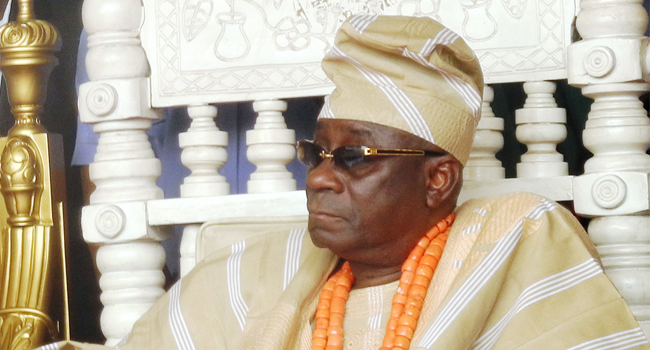The Oba of Lagos, Oba Rilwan Akiolu, has voiced his deep concern over the escalating “get-rich-quick” mentality prevalent among Nigerian youths, characterizing it as a dangerous societal trend that contradicts the fundamental teachings of both Christianity and Islam. He emphasized that both the Bible and the Quran condemn the pursuit of wealth without honest labor and integrity, highlighting the insidious link between this mentality and the rise of cybercrime and other fraudulent activities, especially among the younger generation. The Oba’s remarks came during a courtesy visit by senior officials of the Economic and Financial Crimes Commission (EFCC) to his palace in Lagos, underscoring the gravity of the issue and the urgent need for collective action to address it. He implored the EFCC to remain steadfast in its efforts to restore the nation’s moral fabric, recognizing the crucial role the agency plays in combating financial crimes and promoting ethical behavior.
The Oba’s condemnation of the “get-rich-quick” syndrome reflects a growing awareness of the detrimental impact this mindset has on Nigeria’s social and economic landscape. The pursuit of instant wealth often leads individuals down a path of illegality and corruption, undermining the principles of hard work, honesty, and ethical conduct. It fosters a culture of impunity where criminal activities are normalized, eroding trust in institutions and hindering sustainable development. The Oba’s intervention underscores the importance of moral leadership in shaping societal values and promoting responsible citizenship. His appeal to religious principles further emphasizes the ethical dimensions of the issue and the need for individuals to align their actions with their professed beliefs.
During the visit, the Oba pledged the unwavering support of the traditional institution to the EFCC’s anti-corruption efforts, recognizing the agency’s crucial role in safeguarding the nation’s economic integrity. He commended the EFCC’s commitment to tackling corruption and economic crimes, describing the fight against financial criminality as a collective national responsibility. The Oba’s endorsement carries significant weight, given the traditional institution’s influence and respected position within Nigerian society. His call for collaboration between traditional authorities and law enforcement agencies highlights the importance of a multi-pronged approach to combating corruption, leveraging the strengths of various stakeholders to achieve a common goal.
Ahmad Ghali, the acting director of the EFCC’s Lagos Zonal Directorate 2, led the delegation that visited the Oba’s palace. He expressed gratitude for the royal audience and informed the Oba of the recent establishment of the EFCC’s Lagos Zonal Directorate 2 in Okotie-Eboh, Ikoyi. This new directorate is strategically positioned to enhance the agency’s capacity to combat economic and financial crimes in the region, signaling a renewed commitment to tackling corruption at the grassroots level. Ghali acknowledged the vital role traditional rulers play in shaping societal values and voiced concern over the alarming rise in internet fraud and land-related scams in Lagos State.
Ghali revealed that the directorate receives a constant stream of credible intelligence regarding the alleged involvement of youths in cybercrimes across various communities. This highlights the pervasiveness of online fraud and the urgent need for effective strategies to combat this evolving threat. He also expressed concern over the growing number of land fraud cases, which constitute a significant portion of the directorate’s caseload. Land-related scams often have devastating consequences for victims, depriving them of their property and livelihoods. The prevalence of these scams underscores the need for greater transparency and accountability in land transactions, as well as enhanced law enforcement efforts to prosecute perpetrators.
Ghali appealed to the Oba for support in tackling these challenges, recognizing the monarch’s influence and respected position within the community. He emphasized the Oba’s unique perspective as a revered king and retired super cop, highlighting his ability to provide valuable guidance in navigating the complex terrain of economic and financial crimes. Ghali’s appeal demonstrates the EFCC’s commitment to partnering with traditional authorities and leveraging their influence to combat corruption effectively. The collaboration between law enforcement agencies and traditional institutions is crucial in addressing the root causes of crime and promoting a culture of integrity and accountability.














